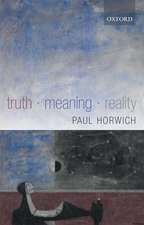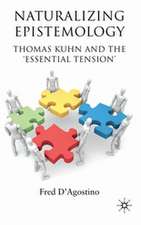Metaphors: Figures of the Mind: Library of Rhetorics, cartea 4
Autor Z. Radmanen Limba Engleză Paperback – 5 dec 2010
| Toate formatele și edițiile | Preț | Express |
|---|---|---|
| Paperback (1) | 635.80 lei 6-8 săpt. | |
| SPRINGER NETHERLANDS – 5 dec 2010 | 635.80 lei 6-8 săpt. | |
| Hardback (1) | 642.18 lei 6-8 săpt. | |
| SPRINGER NETHERLANDS – 31 dec 1996 | 642.18 lei 6-8 săpt. |
Preț: 635.80 lei
Preț vechi: 748.00 lei
-15% Nou
Puncte Express: 954
Preț estimativ în valută:
121.68€ • 126.70$ • 102.83£
121.68€ • 126.70$ • 102.83£
Carte tipărită la comandă
Livrare economică 11-25 martie
Preluare comenzi: 021 569.72.76
Specificații
ISBN-13: 9789048147809
ISBN-10: 9048147808
Pagini: 208
Ilustrații: XVI, 188 p.
Dimensiuni: 155 x 235 x 11 mm
Greutate: 0.29 kg
Ediția:Softcover reprint of hardcover 1st ed. 1997
Editura: SPRINGER NETHERLANDS
Colecția Springer
Seria Library of Rhetorics
Locul publicării:Dordrecht, Netherlands
ISBN-10: 9048147808
Pagini: 208
Ilustrații: XVI, 188 p.
Dimensiuni: 155 x 235 x 11 mm
Greutate: 0.29 kg
Ediția:Softcover reprint of hardcover 1st ed. 1997
Editura: SPRINGER NETHERLANDS
Colecția Springer
Seria Library of Rhetorics
Locul publicării:Dordrecht, Netherlands
Public țintă
ResearchCuprins
1. The Limits of Literalness.- 2. The Polysemic Chain of Meaning.- 3. Difficulties With Diagnosing the Death of a Metaphor.- 4. The Metaphoric Measure Of Meaning in Science.- 5. How is Radically New Knowledge Possible? Or: Bridging the New and the Old in a Metaphorical Way.- 6. How to Make Our Ideas Clear With Metaphors.- 7. Toward a Metaphor-Body Problem.- 8. Artificial Intelligence and the Natural Body.- 9. Key-Metaphors: A Case of Cross-Contextual Cognition.- 10. Of Mind, Metaphysics and Other Matters.- 11. How to Make Worlds With Metaphors.- 12. Metaphorical Projections of Possible Worlds.- Afterthoughts.- Name Index.
Recenzii
`Dr. Radman has presented in Metaphors: Figures of the Mind a clear, excellent account of how metaphor serves as a necessary cognitive key for all human intellectual activity. Radman properly embodies the mind exploring not only metaphorical accounts of mind, but also the metaphorizing, cognitive function of mind. He further examines the metaphorical claims of artificial intelligence and the use of Stephen Pepper's `root metaphors' or `key metaphors' as Radman calls them, to create worldviews. Radman draws on both contemporary accounts of metaphor and classical works. His text is rich with examples drawn from English and German writers. I highly recommend Radman's work for both readers familiar with the various controversies about metaphor and new readers unacquainted with this topic.'
Earl R. MacCormac, Consulting Professor of Radiology, Duke University Medical Center
`Most discussions of metaphor tacitly assume that literal meaning is direct, precise, and unproblematic, while metaphorical meaning is indirect, vague, and fraught with semantic and epistemological difficulties. Zdravko Radman's Metaphors: Figures of the Mind undercuts this complacent assumption. It shows that literal meaning is an achievement that results from a series of explorations, elaborations, projections and refinements, many of them metaphorical.'
Catherine Z. Elgin, Professor of Philosophy, Harvard University
`It is hardly an exaggeration to view the cognitive approach to metaphor as the emergence of a new paradigm: not only because the questions asked by the various scholars are now couched in radically different terms. For this reason, serious and well-informed syntheses are welcome, if one is to burrow one's way through the mountain of research and theories produced by `metaphormania' of the nineteen eighties. In Metaphors: Figures of the Mind, Radman offers such a status quaestionis, and in addition traces paths of thought, investigation and application which take the reader beyond the bounds of mainstream metaphorology.'
Jean-Pierre van Noppen, Professor of English Linguistics, Université Libre de Bruxelles
Earl R. MacCormac, Consulting Professor of Radiology, Duke University Medical Center
`Most discussions of metaphor tacitly assume that literal meaning is direct, precise, and unproblematic, while metaphorical meaning is indirect, vague, and fraught with semantic and epistemological difficulties. Zdravko Radman's Metaphors: Figures of the Mind undercuts this complacent assumption. It shows that literal meaning is an achievement that results from a series of explorations, elaborations, projections and refinements, many of them metaphorical.'
Catherine Z. Elgin, Professor of Philosophy, Harvard University
`It is hardly an exaggeration to view the cognitive approach to metaphor as the emergence of a new paradigm: not only because the questions asked by the various scholars are now couched in radically different terms. For this reason, serious and well-informed syntheses are welcome, if one is to burrow one's way through the mountain of research and theories produced by `metaphormania' of the nineteen eighties. In Metaphors: Figures of the Mind, Radman offers such a status quaestionis, and in addition traces paths of thought, investigation and application which take the reader beyond the bounds of mainstream metaphorology.'
Jean-Pierre van Noppen, Professor of English Linguistics, Université Libre de Bruxelles























